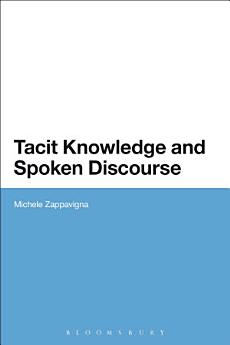Tacit Knowledge and Spoken Discourse
ožu 2013. · Bloomsbury Publishing
E-knjiga
256
str.
reportOcjene i recenzije nisu potvrđene Saznajte više
O ovoj e-knjizi
Professional Linguistics is an emergent area of study within applied linguistics, using discourse analysis to assist people working in professional domains. This book examines tacit knowledge - that expertise that is considered to be lost when skilled practitioners leave an institution.
Traditionally it has been argued that some aspects practical knowledge cannot be articulated. However, the premise of Polyani's theory of Tacit Knowing ("we know more than we can tell") does not account for latent patterns that linguists can uncover in spoken language. Understanding these discourse patterns provides a way to explore the assumptions people invoke, but do not make explicit in their work and working relationships.
This book demonstrates an interview method grounded in systemic functional linguistics that probes the spoken discourse of IT professionals, through three field studies with actual corporations. It argues that 'we tell more than we know' and this 'telling more' resides in the taken-as-given patters of grammar and semantics, making meaning in ways which speakers themselves may not be attuned to.
Traditionally it has been argued that some aspects practical knowledge cannot be articulated. However, the premise of Polyani's theory of Tacit Knowing ("we know more than we can tell") does not account for latent patterns that linguists can uncover in spoken language. Understanding these discourse patterns provides a way to explore the assumptions people invoke, but do not make explicit in their work and working relationships.
This book demonstrates an interview method grounded in systemic functional linguistics that probes the spoken discourse of IT professionals, through three field studies with actual corporations. It argues that 'we tell more than we know' and this 'telling more' resides in the taken-as-given patters of grammar and semantics, making meaning in ways which speakers themselves may not be attuned to.
O autoru
Michele Zappavigna is an Australian Research Council (ARC) Postdoctoral Fellow in Linguistics at the University of Sydney, Australia.
Ocijenite ovu e-knjigu
Recite nam što mislite.
Informacije o čitanju
Pametni telefoni i tableti
Instalirajte aplikaciju Google Play knjige za Android i iPad/iPhone. Automatski se sinkronizira s vašim računom i omogućuje vam da čitate online ili offline gdje god bili.
Prijenosna i stolna računala
Audioknjige kupljene na Google Playu možete slušati pomoću web-preglednika na računalu.
Elektronički čitači i ostali uređaji
Za čitanje na uređajima s elektroničkom tintom, kao što su Kobo e-čitači, trebate preuzeti datoteku i prenijeti je na svoj uređaj. Slijedite detaljne upute u centru za pomoć za prijenos datoteka na podržane e-čitače.






